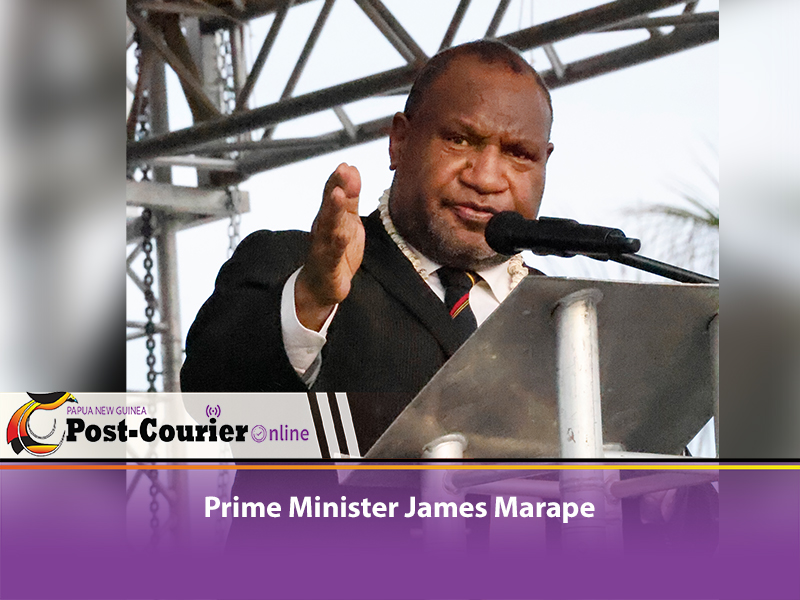By postcourieronline
Prime Minister James Marape has reiterated his government’s dedication to reforming Papua New Guinea’s alcohol and tobacco sectors. This includes combating illicit trade, promoting safe and legal consumption, and supporting legitimate businesses. The Prime Minister made these statements during the official launch of the FTI Consulting Report on Illicit Alcohol in Papua New Guinea.
Prime Minister Marape commended the contributions of FTI Consulting, the Manufacturers Council of PNG, the Port Moresby Chamber of Commerce and Industry, and other stakeholders to the report, highlighting its importance in addressing the harmful impacts of black-market alcohol in the country. He acknowledged the valuable statistics, rationales, and findings provided, stating that they ensure policies are relevant and effective.
The FTI report, the first of its kind in Papua New Guinea, indicates that in 2024, 71% of all alcohol consumed in urban and peri-urban areas was illicit, totaling 7.45 million liters of pure alcohol. This illicit trade resulted in an estimated K2.59 billion loss in tax revenue for the nation. The report also revealed a significant affordability gap between legal and illicit products; a minimum wage worker would need to work over three hours for one licensed standard drink, but only 12 minutes for a dangerous illicit brew. The study concludes that Papua New Guinea has effectively “taxed itself into a public health emergency,” driven by these price signals and rising excise rates on legal alcohol.
Outdated Colonial-Era Laws Must Be Reformed
Prime Minister Marape urged relevant government departments, including Treasury, Commerce and Industry, Police, and the State Solicitor’s Office, to urgently review and modernize alcohol-related legislation, some of which dates back to the 1950s. He specifically mentioned the Excise Act 1956 and the Distillation Act 1955 as “legacy laws inherited at Independence in 1975” that need to be updated to reflect modern realities in 2025. The Prime Minister emphasized that a clear legal and regulatory framework is crucial for eliminating black market participants, safeguarding consumers, and ensuring fair competition for legitimate businesses.
Strengthening Enforcement, Supporting Legal Trade
Prime Minister Marape commended the Customs Service and Police for their success in reducing illegal tobacco imports over the past six years, noting the direct correlation with increased revenue from legal sales. He stated that the reduction of illegal cigarettes has been “monumental” since his government took office and that the same approach is needed for illicit alcohol. He also acknowledged the contributions of legal producers, including British American Tobacco (BAT), and reaffirmed his commitment to supporting formal businesses through clear, fair, and enforceable policies.
Safe Consumption and Public Health
While personally choosing to abstain from alcohol and tobacco, Prime Minister Marape recognized the existence of legal consumption and the need for its responsible management. He stressed that if people choose to drink, they must do so safely and legally, as illicit brews are toxic and unsafe, and the public must be protected. He called for alcohol to be removed from informal street sales and sold only through properly licensed outlets with strict safety standards.
Toward a Modern Economy with Lower Taxes and Higher Compliance
Prime Minister Marape stated that his government is working towards an economy that supports legal businesses, lowers taxes, and enforces compliance. He expressed his aim to reduce tariffs and taxes and step up enforcement and penalties on illegal operators when the K200 billion economic target is reached, hopefully by 2029 or 2030. The government is targeting a surplus budget by 2027, after which it will explore further tax reforms to open up the economy and reduce reliance on high tariffs. The FTI report estimates that illicit alcohol trade caused a 0.7% annual loss to PNG’s GDP in 2024 alone. If unaddressed, this could lead to an 8% long-term drag on national growth, reducing household income, public service capacity, and formal sector jobs.
Call to Action and Government Assurance
The Prime Minister committed to reviewing the report’s recommendations and collaborating closely with the industry to implement changes. He welcomed the report and its recommendations, stating his intent to work with the industry, chamber, and relevant agencies to ensure legal, safe, and properly regulated alcohol and tobacco markets. He concluded by emphasizing the importance of protecting lives, supporting legal businesses, and cleaning up the sector for the benefit of all Papua New Guineans.
